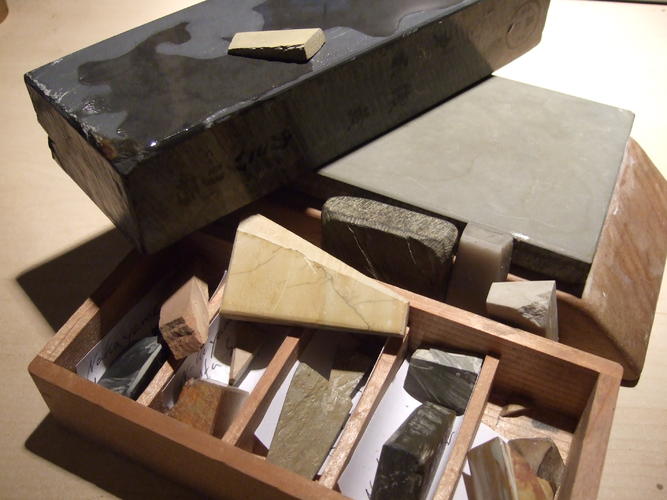Results 31 to 40 of 60
Threaded View
-
01-27-2013, 09:25 PM #1
 Jnat Finisher honing with Water Only
Jnat Finisher honing with Water Only
Help me out here!
I've done every possible test I can think of on some fine Jnat finishers.
There is now way these stones can be of any use for honing with water only.
The rocks are; Otaniyama Asagi Kamisori and Nakayama Asagi + all types of tomonaguras I could think of.

If used with water only I get this "Hikitsuri", the friction between the steel and stone gives vibrations and the blade jumps.
It will also with the slightest pressure knock off pieces of the stones that scratch stone and steel badly.
If I on the other hand use the slightest slurry they behave nice and gives really fine edges.
The finer the tomonagura the finer the edge.
The finest edge I've ever got was with a piece of Narutaki Jizuya, I did that last night and that's the reason why I'm posting this now.
I know Narutaki Jizuya would not be considered a normal tomonagura, I got some stones mixed up and used it by mistake, best mistake ever!
Iwasaki in the translation by JimR (Thanks!) do not mention anything like honing with water only, he say you always should use a tomonagura.
I can hone fine with water only on my less fine grit stones, but not on these.
So, are there really good finishers that works with water only?
Won't a softer stone that will self slurry always give of fresh particles to the slurry and thus mess up the honing?
-
The Following User Says Thank You to Lemur For This Useful Post:
Disburden (04-21-2013)


 47Likes
47Likes LinkBack URL
LinkBack URL About LinkBacks
About LinkBacks






 Reply With Quote
Reply With Quote